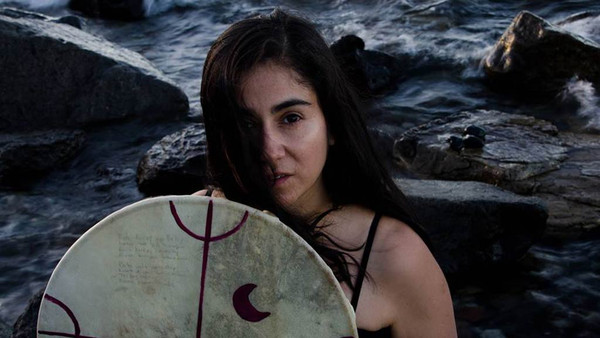
Anahi Rayen Mariluan
voc,
Singer of World
“If there are ways to introduce myself, I would say I’m a singer” says Mariluán “or a translator of the sounds that surround us, because according to my people, definitions are not static. In order for one to introduce oneself, one should describe his or her tuwun (origin) and therefore one should talk about his or her ancestors, and the lands they inhabited. That’s the core of one’s identity: it is an ‘us’, a long past and a longer future.” Anahí Rayén Mariluán’s lyrics are characterized by being written mostly in mapuzungun tongue, the language of Mapuche people. Along with guitarist Leopoldo Caracoche and the tecladist Natalia Cabello as well as other musicians from the Patagonian region of Argentina, Anahí uses traditional Mapuche music as a source as to approach to a contemporary sound, while combining Mapuche instruments with atmospheres from different roots. Her first solo album, released in 2015, is named Kisulelaiñ, which means “we are not alone”. The title makes reference to the women of the people and the deepest aspects of Mapuche’s worldview. Her second album, released the following year, is titled Amulepe taiñ purrun, by which the musician expresses: let our dance go on! Before starting her soloist career, Anahí released two other albums along with her former group project Tamborelá which stands for “drums in female hands”. Ther first album was called Tambor+Ella, 2005 (Drum+Her), while the second one was named Mujeres al pié de la Cordillera, 2009. Mariluán also directed the documentary Cantos de la memoria, cantos con sentido (Chants with memory, chants with meaning), released in 2008. This documentary shows the tradition of the female singers that live in the north of Neuquén, an Argentinian province, where a fragment of Andes mountain chain is located. The documentary has been awarded by the National Association of Documentary Makers as the best anthropologic documentary, in 2009. In partnership with Julieta Medina, a ceramist, she published a book+CD called Instrumentos de barro, tierra que canta (clay instruments, soil that sings), which is about the autonomous hand making of instrument made of clay. Her music video Mapukimun obtained the first prize at the Audiovisual Festival of Bariloche (FAB, 2015). The video was directed by María Manzanares and Bruno Osorio, who also directed the video YATESH, whose music was composed by Mariluán as well. During 2017, she has been touring around Germany, Peru and Chile, as well as Patagonian cities, giving frequent concerts. Currently, Anahí is focused on the composition of music with Mapuche roots, ethnicity to which she belongs. Already having two albums, produced in a very short period of time (2015 and 2016), she’s preparing to release a third one. Traducción Guadalupe Moyano.
Popular Tracks 

Track list and 30sec audio provided by ![]()
Discography
| Title | Artist | Year | Type |
|---|---|---|---|
| Amulepe Taiñ Purrun | Anahi Rayen Mariluan | 2016 | Album |
